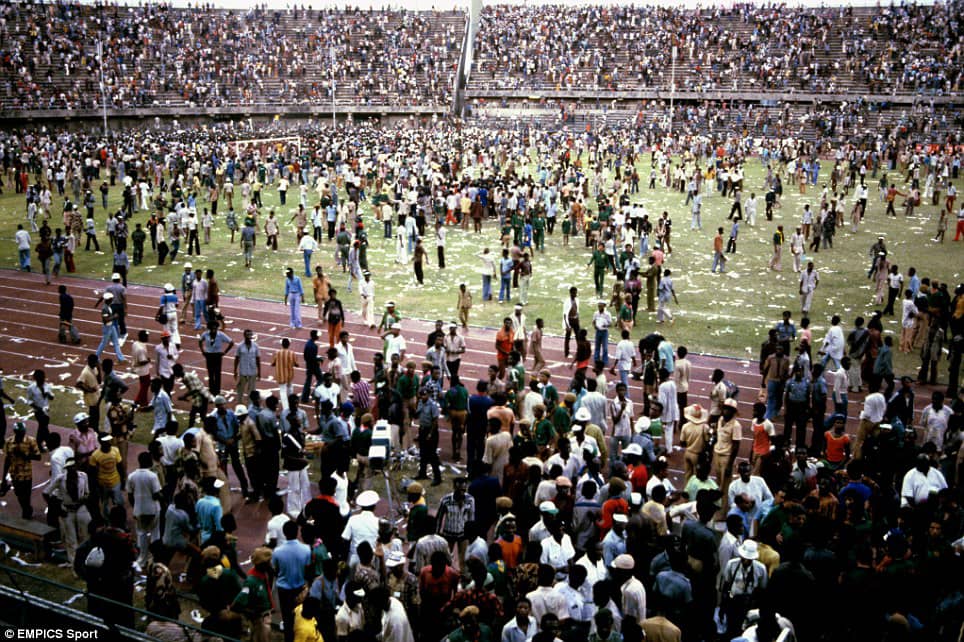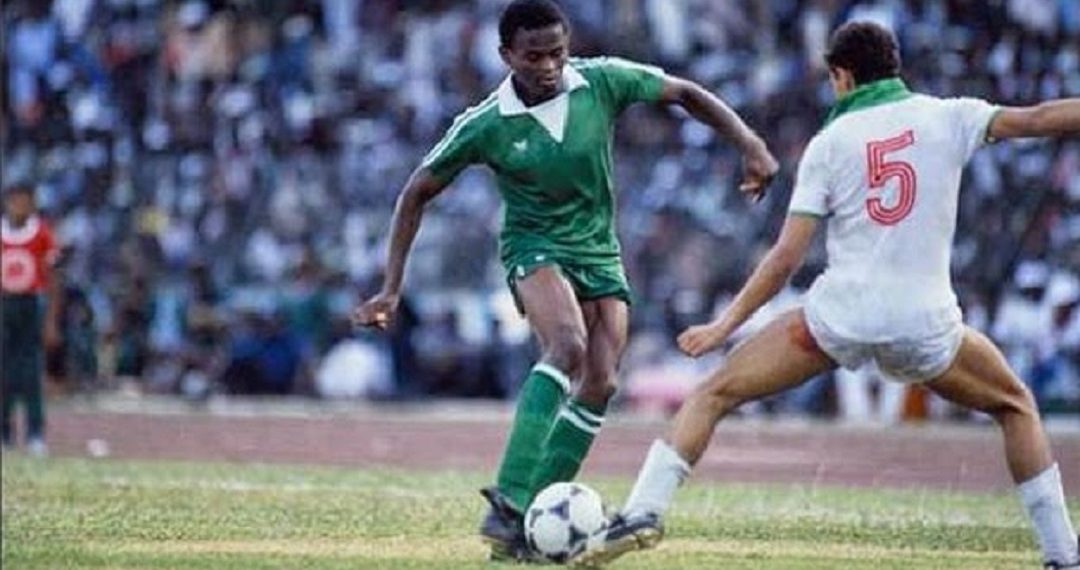On this day 22 March 1980 (Exactly 39 years ago) The Green Eagles of Nigeria won the country’s first African Nations Cup after beating Algeria 3-0 at the National Stadium, Surulere.

Nigeria had earlier won a “minor” trophy – the soccer gold medal at the 1973 All-Africa Games at the same venue – but the triumph seven years later remains the first and most memorable achievement of the Green Eagles .
The preparation for the 1980 Nations Cup started four years to the commencement of the competition.
During that time, the team trained and travelled to the nook and crevice of the world. Between the 1976 Nations Cup to the one the country hosted four years later, the Green Eagles visited several countries in Africa, Asia, Europe and the Americas training and playing friendly matches that stood them in good stead ahead of the 1976 Nations Cup, the 1976 Olympics (which the country later withdrew from), the 1978 All-Africa Games in Algeria, the Nations Cup in Ghana and eventually, the 1980 Nations Cup.
No cost was spared as the team camped in Hennef in West Germany which was arguably the best camping site in Europe as at that time. The team then moved to Bulgaria and Yugoslavia. The trips not only exposed the players to the latest and best sporting facilities in the world but taught them lessons in inferiority complex!
Picture Zaire in the 1974 World Cup and what you see is a team heavily laden with complex issues. That’s exactly what the Green Eagles fought with while on tour. Blacks were viewed in lesser light and the only national team that accepted to play the Green Eagles was Bulgaria (the same country 14 years later Rashidi Yekini and his teammates taught the art of playing the game after a 3-0 whitewash – no pun intended – at USA ’94 World Cup) who accepted to condescend and play a team from Africa.
Nigeria lost the game 2-1 but showed they were no monkeys!
At the eve of the Olympics, the Green Eagles went to Canada where they were involved in two friendly games. Nigeria beat Canada, the eventual quarterfinalist at the Olympics, in their first game. It was a major psychological boost comparable to what African fighters drafted to World War I felt when they saw the Whiteman fall from a shot from their guns!
They couldn’t play their second friendly match because the Brazilian Olympic team was at the stand when the Green Eagles taught the Canadians Football 101 lessons. The almighty Brazil chickened out!
Nigeria eventually boycotted the Olympics, but the team was “compensated” with a three-week training tour of China.
Preparation for the 1980 Nations Cup proper involved a three-month comprehensive training camp in Brazil – the world’s football capital. What the team learnt in those three months changed their perspective of the game.
“The level of football and the quality of players that we saw humbled us and made us work doubly hard to catch up,” Segun Odegbami, the joint top-scorer of the 1980 Nations Cup with three goals, said.
“I realised for the first time the gulf that existed between football in South America and the rest of the world especially in Africa. We had rare opportunity to study the Brazilians closely, to watch their training methods, to play against many of their teams, and to watch many of their league matches
“Many of us that went to Brazil came back to Nigeria totally different people. Brazil was a football education for me.”
Tanzania, Ivory Coast, Egypt, Morocco and Algeria got a dose of that education at the Nations Cup!
Goal scoring responsibility was evenly spread in the team as five players – Muda Lawal, Ifeanyi Onyeadika, Odegbami, Okey Isima, and Felix Owolabi – bagged the eight goals the team scored in the five games in Lagos.
In the final against Algeria, who were clear favourites, the Green Eagles played like a house on fire and consumed the North African team. Two goals in the 2nd and 42nd minutes by Odegbami gave the team a “shock” lead in the first half.
Midfielder maestro Muda Lawal, playing as a striker, put the icing on the cake in the 50th minute to seal a historic win for a team who played with great confidence and gait – like the Brazilians!
After the triumph, the federal government promised to show “appreciation” to the players and coaching crew. The Shagari-led government duly fulfilled their promise showering the team with a national honour, a house in FESTAC Town, and a car.
Match Summary
Final
Lagos, National stadium
Attendance : 80,000
Nigeria 3-0 Algeria
[Segun Odegbami 2, 42, Muda Lawal 50]
Nigeria Line-up : Best Ogedengbe, David Adiele, Christian Chukwu,Babatunde Bamidele, Alloysius Atuegbu, Godwin Odiye (Ikhana Kadiri), Felix Owolabi, Okey Isima, Segun Odegbami, Muda Lawal, Adokie Amiesemeka
Algeria Line-up : Mehdi Cerbah,Chaâbane Merzekane, Abdelkader Horr, Mohamed Kheddis, Mustapha Kouici, Bouzid Mahyouz, Ali Fergani, Lakhdar Belloumi (Mohamed Redouane Guemri), Salah Assad, Tadj Bensaoula (Rabah Madjer),
Hocine Benmiloudi
Referee: Gebreyesus Tesfaye (Ethiopia)
On this day 22 March 2013 (Exactly 6 years ago) Joseph “King Kong”Agbeko became the new International Boxing Organisation (IBO) Bantamweight Champion after beating Luiz Melendez from Colombia in a 12 rounds bout at the Accra Sports Stadium last.
The Ghanaian pugilist won the bout by a unanimous decision. Deon Dwarte of South Africa, Ataa Eddie Pappoe of Ghana and Laten Oumgar from the Netherlands scored the bout117-111, 119-119 and 117-113 respectively.
On this day 22 March 1997 (Exactly 22 years ago) Ghana’s Azumah Nelson, widely considered the greatest African boxer of all time, lost the Lineal & WBC Super featherweight titles to Genaro Hernandez of America when beaten on points in twelve rounds. He was almost disqualified when he accidentally hit Hernandez in the throat after the bell to finish round seven and Hernandez lay on the floor for several minutes. However, Hernandez chose to continue, allowing Nelson to lose by the more honorable way of the judge’s decision
Location: Memorial Coliseum, Corpus Christi, Texas, USA
Referee: Laurence Cole
Judge: Alfred Asaro 115-113
Judge: Richard James Davies 118-110
Judge: Gale Van Hoy 113-114
Hernandez was busier as he controlled the fight from the outside. Nelson pressed forward, but was unable to land on a consistent basis.
Nelson landed to the throat after the bell for round seven, and Hernandez went down. Given five minutes to rest, he continued, and Nelson was deducted one point.
On this day 22 March 1967 (Exactly 52 years ago) Muhammad Ali KOs Zora Folley in round 7 for heavyweight boxing title at the Madison Square Garden, New York, New York, USA
Muhammad Ali vs. Zora Folley was the first World Heavyweight Championship fight to be held at Madison Square Garden since Ezzard Charles vs. Lee Oma on January 12, 1951.
Folley was The Ring Mgazine’s No. 1-ranked heavyweight contender .Ali was a 7 to 1 betting favorite.
The fight was televised by RKO General and Madison Square Garden in more than 150 cities. New York City was blacked out.There was a snowstorm on the day of the fight, which affected attendance.
There was a crowd of 13,780.
The gross gate was $244,471, which broke the previous Madison Square Garden record of $239,959.
Ali collected about $260,000 on his 50 percent of the net gate and $150,000 from ancillary rights. Folley earned his largest purse, about $58,000 on 15 percent of the net and $25,000 from ancillaries.
At the time of the knockout, Referee Johnny LoBianca and Judge Frank Forbes had Ali ahead 4-2 in rounds, and Judge Tony Castellano had the fight even, 3-3. The Associated Press had Ali in front 3-2-1.
Ali planned to fight Oscar Bonavena on May 27 in Tokyo, Japan, and then Thad Spencer on July 22 in San Francisco, California. However, seven days before the Folley fight, he was ordered to report for induction into the United States Army in April. Ali, who had unsuccessfully sought draft exemption as a conscientious objector, refused to be inducted. Due to his refusal and subsequent legal battles, he didn’t fight again for three and a half years.
Folley did accomplish some things. He cut the ring down on Ali. He hit the champion more often than any other opponent with solid right hands and slip jabs. He did not panic when Ali got cute and, faking and feinting, he forced Ali to miss several good punches. On the negative side—besides being knocked out—he obstinately clung to one stratagem; while moving to his right, he kept looking to throw a right-hand counter. It did not take Ali long to learn that he could go in flat-footed and ram home his good right hand, which so many people doubt he possesses.
It is also a popular opinion that Ali just played with Folley the first two rounds, but it is more likely that he was measuring Folley’s reactions and the strength of his punches. It wasn’t until the third round that Ali began working. His straight left hands—not his jab—kept snapping Folley’s head back, and these were the punches that started Folley on his way out. At the end of the third round, Ali told his corner that Folley had begun to tire, that his punches had lost some of their life.
In the fourth, Ali, now punching flat-footed, spun Folley around with a left hook and then banged a right hand in back of his ear. Folley went down; he was flat on his stomach, and then suddenly he was up, his nose streaming blood, and he was kneeling and looking to his corner for the count. Folley raged back, but he had left too much of himself on the floor. Ali, it appeared, carried Folley in the fifth and sixth rounds, but going into the seventh Herbert Muhammad, his manager, told him to “stop playin’.” He did. Two rights, the first of which traveled roughly six inches, gave Ali his 29th straight victory and his ninth successful title defense
On this day 22 March 1986 (Exactly 33 years ago) Trevor Berbick beat Pinklon Thomas in round 15 for heavyweight boxing title
Location: Riviera Hotel & Casino, Las Vegas, Nevada, USA
Referee: Richard Steele
Judge: Art Lurie 115-114
Judge: Paul Smith 115-113
Judge: Arlen Bynum 115-113
World Boxing Council Heavyweight Title (2nd defense by Thomas)
On this day 22 March 1896 (Exactly 123 years ago) Charilaos Vasilakos of Greece won the 1st modern marathon in 3:18 at the Panhellenic Games
Greece held the first modern Panhellenic Games. The main purpose of the games was to select the team that would compete in the first Modern Olympic Games later the same year. All participants were members of Greek sports clubs. Vasilakos had a reputation as a strong long-distance runner. He won the marathon race with a time of 3 hours and 18 minutes.
Vasilakos was one of seventeen athletes to start the Olympic race on April 10, 1896. He finished in second place, behind Spiridon Louis, with a time of 3:06.03 as one of only nine finishers. Both races were on 40 kilometre courses rather than the now-standard 42.195 kilometres.
By George ‘Alan Green’ Mahamah




















